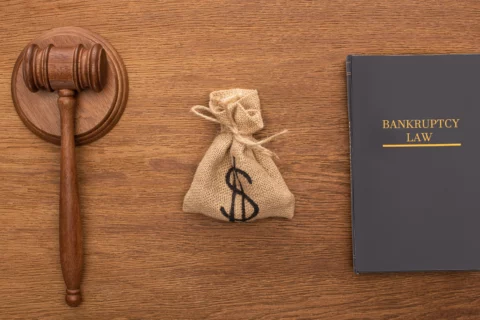When Does My Chapter 7 Bankruptcy Case End?
Are You Wondering When The Final Chapter Of Your Chapter 7 Bankruptcy Case Ends?
Are you currently going through a Chapter 7 bankruptcy case and find yourself wondering and asking this question “when does my Chapter 7 bankruptcy end?”. If so, you’re not alone. Many individuals facing financial challenges seek clarity on the timeline and conclusion of their bankruptcy journey. Understanding the endgame can provide a glimmer of hope and motivation as you navigate this difficult process. In this article, we’ll shed light on when your Chapter 7 bankruptcy case might end, empowering you with the knowledge you need to move forward confidently toward a brighter financial future.
At Cutler & Associates, Ltd., we specialize in guiding individuals like you through bankruptcy proceedings. Our team of experienced attorneys is dedicated to unraveling the complexities, providing you with the knowledge and support you need to navigate through the process seamlessly.
Don’t let unanswered questions hold you back. Take action today! Join us as we delve into the intricacies of your Chapter 7 bankruptcy case, demystify the timeline, and equip you with the tools to reclaim control over your financial destiny. Let Cutler & Associates, Ltd. be your trusted companion on this transformative journey toward a debt-free tomorrow.
Together, we will uncover the answers you seek and pave the way to a brighter, more secure future. Don’t wait a moment longer. Take that crucial step towards financial liberation and contact Cutler & Associates, Ltd. Your path to a fresh start awaits!
What is Chapter 7 Bankruptcy?
The primary purpose of Chapter 7 bankruptcy is to offer relief to debtors overwhelmed by unmanageable debts and unable to repay their creditors. By filing for Chapter 7 bankruptcy, individuals like you and businesses can seek protection from your creditors and have your eligible debts discharged, which means you are no longer legally obligated to repay them.
Chapter 7 bankruptcy operates on the principle of liquidation. Under this process, a trustee is appointed to collect and sell the debtor’s non-exempt assets, converting them into cash. The proceeds from the liquidation are then used to pay off a portion of the debtor’s outstanding debts. However, many individuals filing for Chapter 7 bankruptcy can keep most, if not all, of their assets through exemptions provided by law.
The goal of Chapter 7 bankruptcy is to give you a fresh start financially, relieving your burden of overwhelming debt and allowing you to rebuild your financial life. It offers a way for debtors to regain control of their finances and move towards a more stable and secure future.
What is the Timeline of a Chapter 7 Bankruptcy Case in Illinois State?
Embarking on a Chapter 7 bankruptcy case in Illinois state quires a clear understanding of the timeline involved. This process follows a structured sequence of steps and deadlines that individuals must navigate to achieve debt relief and a fresh financial start. Here is a general overview of the timeline for a Chapter 7 bankruptcy case in Illinois State.
Pre-Filing:
Before filing for Chapter 7 bankruptcy, gathering financial information, completing credit counseling, and preparing the necessary documentation is essential. This stage involves assessing your debts, assets, income, expenses, and other relevant financial details.
Filing the Petition:
The formal process begins with filing a Chapter 7 bankruptcy petition with the bankruptcy court in your jurisdiction. This initiates an automatic stay, which halts creditor actions and collections against you.
Meeting of Creditors (341 Meeting):
Approximately four to six weeks after filing, a Meeting of Creditors, also known as the 341 Meeting, occurs. During this meeting, you, your bankruptcy trustee, and any creditors who choose to discuss your financial situation. It is an opportunity for the trustee and creditors to ask questions regarding your bankruptcy case.
Asset Liquidation:
If you have non-exempt assets that can be sold to repay creditors, the trustee may liquidate them during this stage. However, it’s important to note that many individuals like you filing for Chapter 7 bankruptcy can protect your assets through exemptions provided by law.
Debt Discharge:
The debt discharge is the ultimate goal of a Chapter 7 bankruptcy case. Typically, the discharge occurs a few months after the 341 Meeting, once the trustee and creditors have had an opportunity to review the case. The discharge eliminates your personal liability for most qualifying debts, relieving you from the obligation to repay them.
Case Closure
After the debt discharge, the bankruptcy court will close your Chapter 7 case. This final step marks the formal conclusion of the bankruptcy process.
Please consult our bankruptcy attorney at Cutler & Associates, Ltd for personalized guidance for your Chapter 7 bankruptcy case in Illinois State.
What are the Factors Influencing the Duration of Chapter 7 Bankruptcy Case?
A thorough understanding of the factors that influence the duration of a Chapter 7 bankruptcy case in Illinois State is essential for individuals like you pursuing debt relief and aiming for a new beginning in your financial life. Successfully navigating the Chapter 7 bankruptcy process requires awareness of these factors and their potential impact on the timeline of your case.
The complexity of the case
The complexity of a Chapter 7 bankruptcy case can impact its duration. It may take longer to resolve if the claim involves extensive assets, significant debts, or disputes with creditors. Additionally, if there are legal challenges or complications during the process, it can further extend the timeline.
Compliance with Requirements
Adhering to the requirements set by the bankruptcy court is crucial. Any delays or failure to provide accurate and complete documentation, attend mandatory meetings, or meet deadlines can significantly prolong the case.
Court Caseload and Administrative Processes
The caseload of the bankruptcy court and its administrative processes can affect the timeline of a Chapter 7 bankruptcy case. High caseloads may delay scheduling hearings and court proceedings, leading to a longer duration.
Creditor Objections and Disputes
If creditors raise objections or disputes regarding the discharge ability of specific debts or the legitimacy of your bankruptcy filing, it can prolong your case. Resolving these objections may require additional court hearings and negotiations, which can extend the timeline.
Trustee Review and Asset Liquidation
In Chapter 7 bankruptcy, a trustee is appointed to oversee the liquidation of non-exempt assets to repay creditors. The complexity and time required for the trustee’s review, valuation, and sale of assets can impact the duration of the case.
Completion of Mandatory Financial Education
You must complete a mandatory financial education course before receiving a discharge in a Chapter 7 bankruptcy case. Failure to fulfill this requirement can delay the finalization of your case.
It’s important to note that the duration of a Chapter 7 bankruptcy case can vary based on individual circumstances and the specific factors involved. Consulting with a qualified bankruptcy attorney at Cutler & Associates, Ltd. can provide personalized insights and guidance regarding the expected timeline for when your Chapter 7 bankruptcy case ends.
When Does My Chapter 7 Bankruptcy Case End?
The case ends a few months after the meeting of creditors, also known as the 341 meeting. This meeting typically takes place around 20 to 40 days after the bankruptcy petition is filed. During the meeting, you -the debtor, your attorney, the bankruptcy trustee, and any creditors who choose to discuss the debtor’s financial situation.
After the meeting, the trustee reviews the debtor’s assets, and if there are non-exempt assets, they may be sold or liquidated to repay creditors. Once this process is completed, and there are no objections or complications, the court grants a discharge – the order that forgives a qualified debt, which is the official end of the Chapter 7 bankruptcy case. The discharge typically occurs a few months after the meeting of creditors, releasing the debtor from personal liability for most debts.
Call our Bankruptcy Attorney Today!
Don’t let the burden of overwhelming debt consume your life. Our Chapter 7 bankruptcy lawyer is ready to provide you with the guidance and legal advice you need to overcome this financial hardship. Take charge of your future by taking the first step today. Contact us to schedule a free evaluation with our experienced team, and let us help you explore your options for debt relief.
Always remember, you don’t have to confront this journey by yourself. Our compassionate and knowledgeable attorneys at Cutler & Associates, Ltd. are here to advocate for your best interests and help you achieve a fresh start. Take control of your financial well-being and reach out to our bankruptcy lawyer today.


